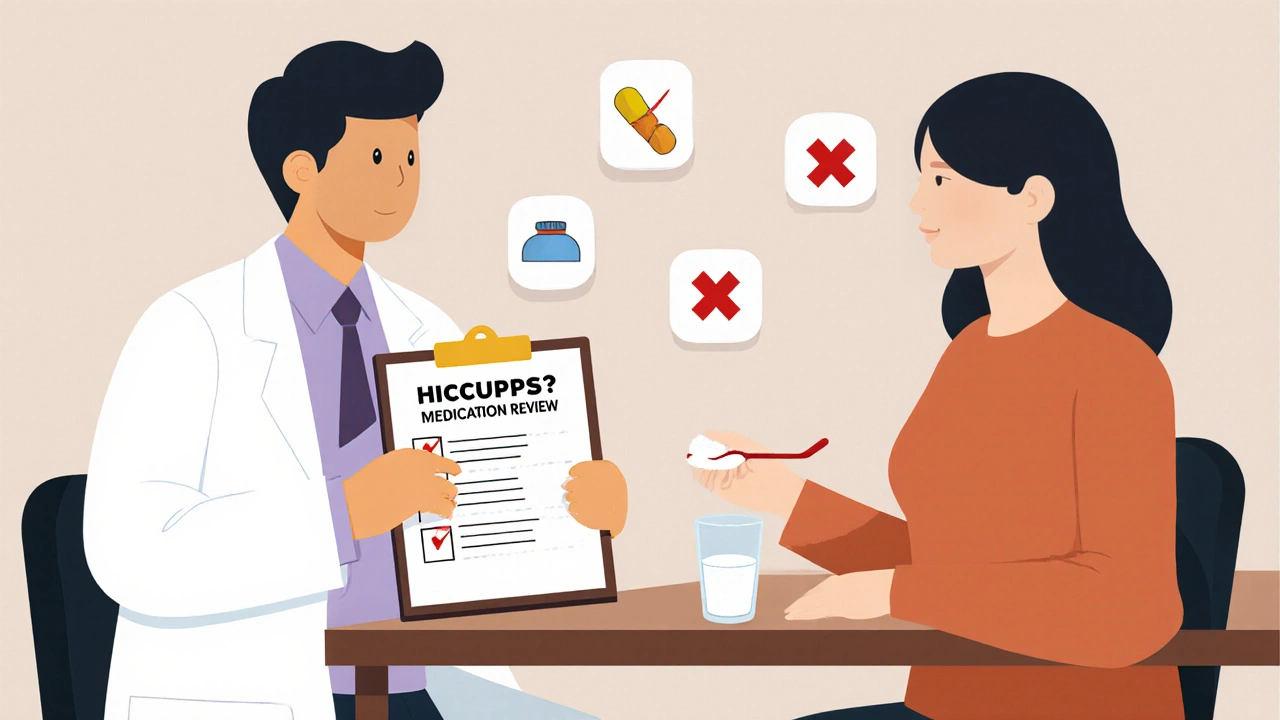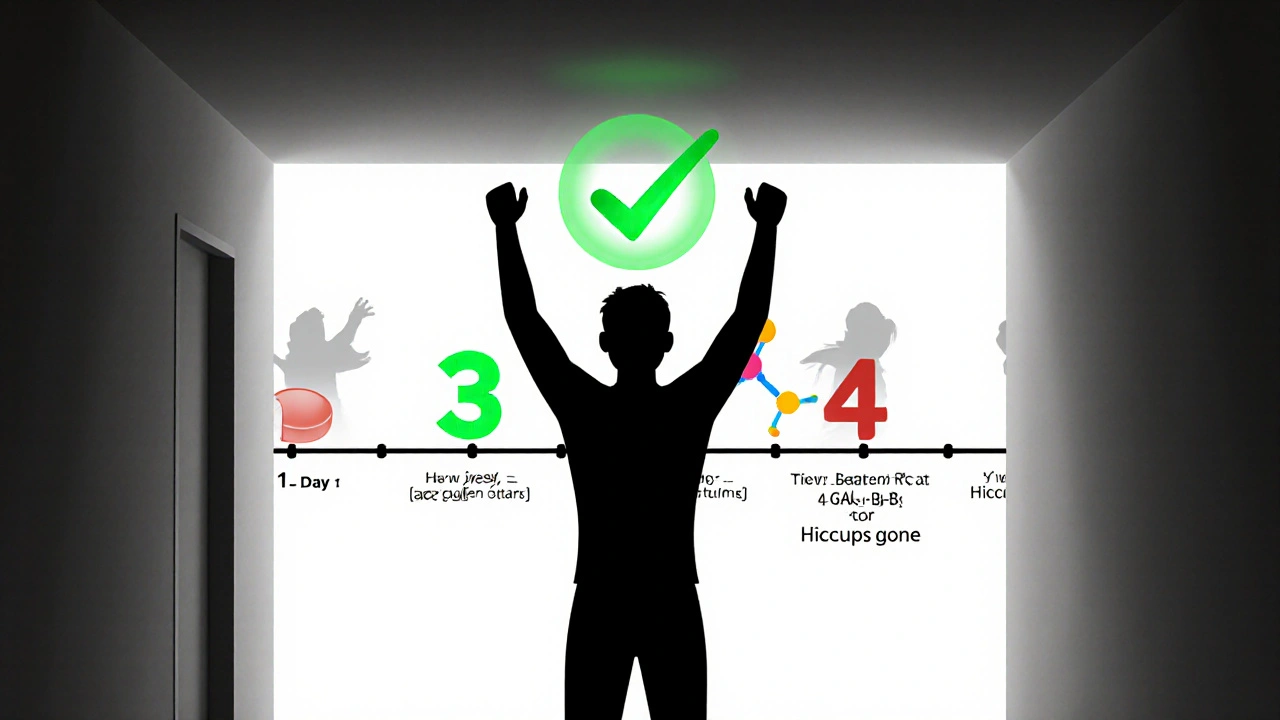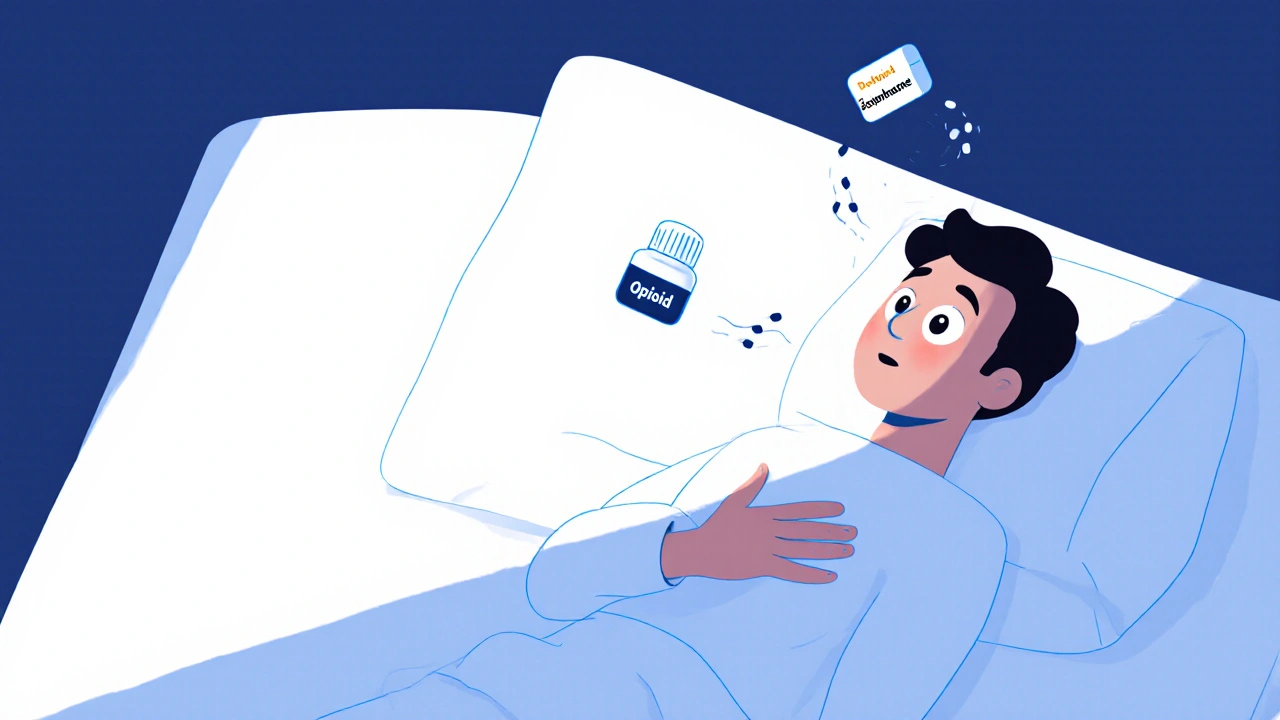Medication Hiccup Risk Calculator
Check Your Medication Risk
Enter the name of your medication to see if it's linked to hiccups
Most people think hiccups are just a silly, short-lived annoyance-something that happens after eating too fast or drinking soda too quickly. But when hiccups last for days, or even weeks, they’re not funny anymore. They can keep you from sleeping, eating, or even talking without interruption. And in some cases, they’re not caused by your lunch-they’re caused by the medicine you’re taking.
Why Your Medicine Might Be Making You Hiccup
Hiccups happen when your diaphragm spasms suddenly, and your vocal cords snap shut, making that classic "hic" sound. It’s a reflex controlled by nerves in your neck and chest, and it’s surprisingly easy for certain drugs to mess with it. The most common offenders? Corticosteroids, opioids, and some chemotherapy drugs.Dexamethasone, a steroid often used during cancer treatment, is one of the biggest culprits. In one study, more than 40% of patients getting dexamethasone along with cisplatin (a chemo drug) developed hiccups. Some people got them after just one 8mg dose. It’s not just the dose, either-some people are just more sensitive. Men are more likely than women to get them, though no one knows exactly why.
Opioids like morphine and oxycodone can also trigger hiccups, especially in people using them long-term for pain. About 5 to 7% of chronic pain patients report this side effect. The theory? These drugs can relax the stomach, cause bloating, or directly affect the brainstem where the hiccup reflex is controlled.
Other drugs linked to hiccups include midazolam (a sedative used before surgery), azithromycin (an antibiotic), and even prednisone. Even though these are less common, they’ve been documented enough to be taken seriously. The problem? Most drug labels don’t list hiccups as a side effect. So doctors-and patients-often overlook the connection.
How Long Do Medication-Induced Hiccups Last?
Not all hiccups are the same. If they last less than 48 hours, they’re considered transient and usually go away on their own. But if they stick around longer, they become a medical issue.- Transient hiccups: 65% of cases. Usually harmless, often tied to a single dose of medication.
- Persistent hiccups: 30% of cases. Last more than 48 hours. Can disrupt sleep and eating.
- Intractable hiccups: 5% of cases. Last over a month. Can lead to weight loss, exhaustion, and even depression.
One patient on Reddit described 72 hours of nonstop hiccups after a dexamethasone infusion. Another said they couldn’t sleep for three nights straight. These aren’t exaggerations-they’re real stories backed by clinical data. When hiccups last this long, they’re not just annoying. They’re debilitating.
What You Can Do Right Now (At Home)
Before you rush to the doctor, try these simple, proven methods. They work for many people-even when the hiccups are drug-related.- Swallow a teaspoon of granulated sugar. Sounds odd, but a 2021 study in JAMA Internal Medicine found it worked in 72% of cases. The sugar irritates the back of the throat, which can reset the nerve reflex.
- Gargle ice water. Cold water stimulates the vagus nerve, which helps calm the diaphragm. One study showed a 65% success rate.
- Hold your breath. Breathe in deeply, hold for as long as you can (10-20 seconds), then exhale slowly. Repeat 3-5 times. This increases carbon dioxide levels, which can relax the diaphragm.
- Drink water quickly. Sip from the far side of a glass, or try drinking water while bending forward. The distraction and pressure change can interrupt the hiccup cycle.
These aren’t magic tricks-they’re simple, safe, and backed by science. If one doesn’t work, try another. Most people find relief within minutes.

When You Need Medical Help
If your hiccups last more than two days, or if they’re so bad you can’t eat or sleep, it’s time to talk to your doctor. Don’t assume it’s "just a side effect"-there are real treatments available.First, your doctor will check for other causes: acid reflux, lung infections, brain tumors, or kidney problems. Once they rule those out, they’ll look at your meds.
Here’s what doctors typically do next:
- Stop or lower the dose of the suspected drug-if it’s safe to do so. For example, if you’re on dexamethasone for cancer, they might reduce the dose or switch to another steroid like methylprednisolone.
- Try baclofen. This muscle relaxant, usually used for spasticity, is now a first-line treatment for persistent hiccups. It works by calming the nerves involved in the hiccup reflex. Dose: 5mg three times a day. Studies show 60-70% success, especially for steroid-induced hiccups.
- Chlorpromazine. This is the only drug the FDA has officially approved for hiccups (brand name Thorazine). It’s an antipsychotic, but at low doses (25-50mg daily), it’s effective for about half of patients. But it comes with risks: drowsiness, low blood pressure, and movement issues. So it’s usually reserved for when other options fail.
- Try ondansetron. This is a nausea drug, but some patients report that switching from dexamethasone to ondansetron stopped their hiccups entirely. One patient on Patient.info said their 5-day hiccup streak ended within two hours of this switch.
There’s also a new drug in the works-GBX-204, a GABA-B receptor agonist-that showed 82% success in early trials. It’s not available yet, but it could be a game-changer for people who don’t respond to current treatments.
What Doctors Are Doing Differently Now
Five years ago, most doctors didn’t even think to ask if a patient’s hiccups were drug-related. Now, things are changing.The FDA updated dexamethasone’s label in 2021 to include hiccups as a "clinically significant adverse reaction." The European Medicines Agency now requires hiccup data for all new CNS-acting drugs. And in January 2024, the American Medical Association gave medication-induced hiccups its own ICD-10 code: R09.2-MIH. That means doctors can now officially document it-and track it.
More cancer centers are using the Hiccup Symptom Score (HSS) to measure severity. In 2019, only 12% of major centers used it. By 2023, that number jumped to 67%. Why? Because they realized hiccups weren’t just a nuisance-they were affecting patient outcomes. People who got hiccups from chemo were less likely to finish treatment on time.
Some oncologists now give baclofen before dexamethasone to prevent hiccups altogether. In one trial, this cut the hiccup rate from 41% down to just 13%. That’s huge for someone going through cancer treatment.

What You Should Ask Your Doctor
If you’re on medication and getting hiccups, don’t wait for them to go away on their own. Ask these questions:- "Could any of my medications be causing this?"
- "Is there a similar drug that doesn’t cause hiccups?"
- "Can we try baclofen or ondansetron as a preventive measure?"
- "Should I stop taking this drug, or can we reduce the dose?"
- "Is this something I should report to the FDA?"
Most doctors aren’t trained to think about hiccups as a drug side effect. But if you bring it up with data-like the studies from JAMA or the FDA’s updated labeling-they’ll take it seriously.
Why This Matters More Than You Think
Hiccups might seem small, but they cost the U.S. healthcare system an estimated $28.7 million a year. Why? Because people with persistent hiccups end up getting unnecessary CT scans, blood tests, and even hospital stays-all because no one connected the dots to their meds.And it’s not just about money. It’s about quality of life. Someone with cancer who can’t sleep for a week because of hiccups is less likely to fight the disease. Someone with chronic pain who stops taking their opioid because of hiccups might end up in more pain. Recognizing this link saves lives.
There’s growing research too. The Global Hiccup Consortium predicts a 40% increase in funding for hiccup studies between 2023 and 2027. We’re finally starting to treat this as a real medical issue-not just a quirky annoyance.
Can any medication cause hiccups?
Not every medication causes hiccups, but many do. The most common offenders are corticosteroids like dexamethasone and prednisone, opioids like morphine, certain chemotherapy drugs like cisplatin, sedatives like midazolam, and some antibiotics like azithromycin. Even though these side effects aren’t always listed on drug labels, they’ve been documented in clinical studies and patient reports.
How long do medication-induced hiccups usually last?
Most last less than 48 hours and go away on their own. But about 30% become persistent (lasting more than two days), and 5% become intractable (lasting over a month). The longer they last, the more they impact sleep, eating, and mental health. If hiccups persist beyond two days, it’s important to talk to a doctor.
Is there a cure for medication-induced hiccups?
There’s no single "cure," but there are effective treatments. First, try home remedies like swallowing sugar or gargling ice water. If those don’t work, doctors often prescribe baclofen (a muscle relaxant) or chlorpromazine (an FDA-approved drug for hiccups). In some cases, switching or lowering the dose of the triggering medication resolves the issue entirely.
Can I prevent hiccups from happening when I start a new medication?
Yes, in some cases. If you’re starting dexamethasone or another high-risk drug, ask your doctor about preventive baclofen. A 2012 study showed giving 5mg of baclofen twice daily before dexamethasone reduced hiccup rates from 41% to just 13%. Prevention is better than treatment-especially if you’re already dealing with a serious illness.
Why don’t drug labels mention hiccups as a side effect?
Many drug labels don’t list hiccups because they were historically considered too minor or too rare to include. But that’s changing. The FDA updated dexamethasone’s label in 2021 to include hiccups as a clinically significant side effect. More manufacturers are now tracking and reporting hiccup data, especially for drugs targeting the nervous system or used in cancer care.
If you’ve been dealing with hiccups that won’t quit, don’t brush them off. Your medicine might be the cause-and there’s a way to fix it. Talk to your doctor, try the simple remedies, and don’t be afraid to ask for help. You don’t have to suffer through it alone.


Written by Felix Greendale
View all posts by: Felix Greendale